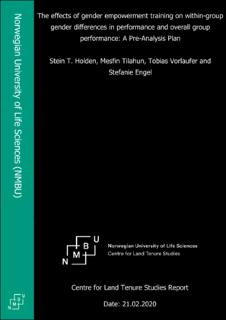The effects of gender empowerment training on within-group gender differences in performance and overall group performance: A Pre-Analysis Plan
This Pre-Analysis Plan is for a Randomized Control Trial (RCT) for recently formed youth business groups in Tigray Region of Ethiopia. Resource-poor rural youth are given a business opportunity by being allocated a rehabilitated land area where they can establish a joint business. They are organized as a primary cooperative and self-organize with a board of five members including a leader and a vice leader. The overall objective of the project is to identify factors that enhance the performance and sustainability of formal youth groups as a business and livelihood option.



